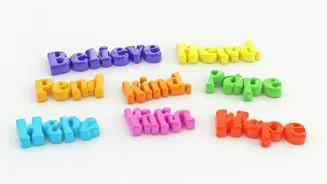Embrace the Brave
Brave: Introducing the word 'brave' equips children to face challenges head-on. It's about acknowledging fear but acting courageously despite it. Parents
and caregivers can foster this by encouraging children to step outside their comfort zones, whether it is trying a new sport, speaking up in class, or facing a difficult situation. Praising their efforts, not just the outcome, reinforces the value of bravery. Share stories of brave individuals, historical or fictional, to demonstrate that courage is not the absence of fear, but the triumph over it. Support your children in their ventures by providing a safe space to fail and learn from those experiences.
Cultivate Curiosity
Curious: Nurturing curiosity encourages children to question, explore, and learn. This positive word fuels a lifelong love of learning and discovery. You can support your child's curiosity by encouraging questions, providing opportunities for exploration, and offering diverse experiences. Visiting museums, reading books, and engaging in hands-on activities are all excellent ways to stimulate their curiosity. It's important to value their questions, even if you don't always have the answers. Encourage them to find the answers themselves, promoting resourcefulness and a spirit of inquiry. This fosters a belief that learning is a continuous journey, not just an end goal.
Promote Helpfulness Always
Helpful: The word 'helpful' instills a sense of responsibility and empathy. It encourages children to consider others' needs and to contribute to their communities. Incorporate opportunities for your child to help at home, such as setting the table or helping with chores. Encourage volunteering in the neighborhood or in school. Discuss how their actions can positively impact others. When children feel useful and see the benefits of their actions, they develop a sense of self-worth and build stronger relationships. Emphasizing the value of helping others cultivates a compassionate outlook and helps them understand that their actions can make a difference in the world.
Build Confidence Daily
Confident: The feeling of 'confident' provides children with the belief in their abilities and potential. It gives them the self-assurance to take risks and pursue their dreams. Parents can help children develop confidence by offering genuine praise, celebrating their efforts, and providing opportunities for them to succeed. Help them to recognize their strengths and acknowledge their accomplishments. Creating a supportive environment where making mistakes is seen as a learning opportunity can boost their self-esteem. Encourage them to try new activities, take on challenges, and believe in themselves, irrespective of the result. Confidence is not about being perfect, but about believing in one's capacity to learn and grow.
Embrace Joyful Moments
Joyful: Injecting the word 'joyful' into their vocabulary brings happiness and positivity to a child's life. Joy is a state of mind, so helping children recognize and appreciate the simple pleasures in life is key. Encourage them to participate in activities that bring them joy, such as playing games, spending time outdoors, or pursuing hobbies. Create a happy and loving atmosphere at home. Teaching them to focus on positive experiences and to look for the good in every situation can help build resilience and optimism. Promote gratitude by encouraging them to identify things they are thankful for, no matter how small. Teaching kids to seek and find joy helps to develop a positive emotional foundation.
Stay Hopeful Always
Hopeful: The word 'hopeful' cultivates a positive outlook and encourages children to believe in a better future. When children feel hopeful, they are better equipped to overcome challenges and persevere through difficult times. You can foster hope by teaching them to set goals, look forward to positive experiences, and believe that good things are possible. Sharing inspiring stories of people who have overcome adversity can also provide a sense of hope. Encourage them to be optimistic and see challenges as opportunities for growth. Help them to develop strategies for dealing with setbacks, such as problem-solving and seeking support. Teaching them to remain hopeful helps foster resilience and a belief in their ability to achieve their goals.
Encourage Patience Always
Patient: Instilling the characteristic of 'patient' equips children with the ability to wait, persevere, and manage their emotions. Teach children that good things often take time and effort. Model patience in your own behavior by remaining calm during stressful situations. Teach them to practice delayed gratification. Encourage activities that require patience, such as gardening or building models. Discuss the importance of waiting for their turn, listening attentively, and not giving up when things get difficult. Praising them for showing patience reinforces its value. Developing patience is vital for building coping skills and managing frustration, which are valuable life skills.
Promote Kindness Frequently
Kind: Using the word 'kind' helps children value and express consideration towards others. It is one of the most essential aspects of developing a sense of community. Encourage acts of kindness, such as sharing toys, helping a friend, or complimenting someone. Teach children to understand and appreciate other people's feelings. Model kindness in your own behavior by being empathetic and respectful. Discuss the impact of their actions, both positive and negative. Create opportunities for them to show kindness, such as volunteering or helping those in need. Emphasizing the importance of kindness promotes compassion, empathy, and strong social connections, all of which are essential for their development.
Value Gratitude Daily
Grateful: Introducing the word 'grateful' nurtures appreciation and contentment in children. It helps them focus on the positive aspects of their lives and develop a sense of happiness. Encourage children to express gratitude for the good things they have, big and small. Model gratitude by expressing appreciation for the things they do. Encourage them to keep a gratitude journal, write thank-you notes, or share what they are grateful for at mealtimes. Teaching children to be grateful builds resilience, improves their overall well-being, and enhances their relationships. Cultivating a grateful mindset helps children to find joy in their lives and recognize the many blessings they receive.
Build Self-Respect
Confident, Joyful, Hopeful, Patient, Kind, Grateful: Integrating these words into a child's everyday vocabulary has a compounding effect. Each word, in itself, is helpful, but the collective effect helps build a solid foundation. These 10 positive words, when incorporated into their daily language, can lead to positive change. A child who is brave will be willing to explore the world. A curious child will seek new experiences. A child who is helpful will be a valuable member of the community. Confident children are better able to believe in themselves, and joyous ones will face the world in good spirits. Hopeful children will be resilient and can overcome setbacks. Patient children will be able to wait for what they want, and a kind child is more likely to develop meaningful relationships. Grateful children will find joy in the little things. All this is built upon a foundation of self-respect.













